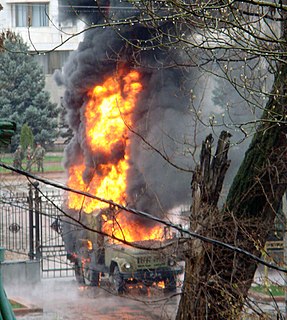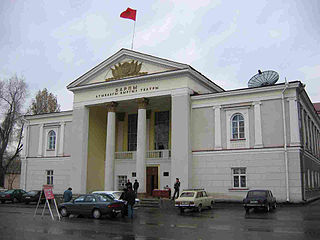
The history of the Kyrgyz people and the land now called Kyrgyzstan goes back more than 2,000 years. Although geographically isolated by its mountainous location, it had an important role as part of the historical Silk Road trade route. In between periods of self-government it was ruled by Göktürks, the Uyghur Empire, and the Khitan people, before being conquered by the Mongols in the 13th century; subsequently it regained independence but was invaded by Kalmyks, Manchus and Uzbeks. In 1876 it became part of the Russian Empire, remaining in the USSR as the Kirghiz Soviet Socialist Republic after the Russian Revolution. Following Mikhael Gorbachev's democratic reforms in the USSR, in 1990 pro-independence candidate Askar Akayev was elected president of the SSR. On 31 August 1991, Kyrgyzstan declared independence from Moscow, and a democratic government was subsequently established.

The Politics of Kyrgyzstan, officially known as the Kyrgyz Republic takes place in the framework of a parliamentary representative democratic republic, whereby the President is head of state and the Prime Minister of Kyrgyzstan is head of government. Executive power is exercised by the government. Legislative power is vested in both the government and parliament. The Economist Intelligence Unit has rated Kyrgyzstan as "hybrid regime" in 2016.

The Tulip Revolution or First Kyrgyz Revolution led to President of Kyrgyzstan, Askar Akayev's fall from power. The revolution began after parliamentary elections on February 27 and March 13, 2005. The revolutionaries alleged corruption and authoritarianism by Akayev, his family and supporters. Akayev fled to Kazakhstan and then to Russia. On April 4, 2005, at the Kyrgyz embassy in Moscow, Akayev signed his resignation statement in the presence of a Kyrgyz parliamentary delegation. The resignation was ratified by the Kyrgyz interim parliament on April 11, 2005.

Felix Sharshenbayevich Kulov is a Kyrgyz politician who was Prime Minister of Kyrgyzstan from 2005 to 2007, following the Tulip Revolution. He first served from 1 September 2005 until he resigned on 19 December 2006. President Kurmanbek Bakiyev reappointed him acting Prime Minister the same day, but parliamentary opposition meant Bakiyev's attempts to renominate Kulov in January 2007 were unsuccessful and on 29 January the assembly's members approved a replacement. Kulov cofounded and leads Ar-Namys, a political party, and chairs the People's Congress, an electoral alliance to which Ar-Namys belongs.

The Collective Security Treaty Organization is an intergovernmental military alliance that was signed on 15 May 1992. In 1992, six post-Soviet states belonging to the Commonwealth of Independent States—Russia, Armenia, Kazakhstan, Kyrgyzstan, Tajikistan, and Uzbekistan—signed the Collective Security Treaty. Three other post-Soviet states—Azerbaijan, Belarus, and Georgia—signed the next year and the treaty took effect in 1994. Five years later, six of the nine—all but Azerbaijan, Georgia, and Uzbekistan—agreed to renew the treaty for five more years, and in 2002 those six agreed to create the Collective Security Treaty Organization as a military alliance. Uzbekistan rejoined the CSTO in 2006 but withdrew in 2012.

Almazbek Sharshenovich Atambayev is a Kyrgyz politician who served as the President of Kyrgyzstan from 1 December 2011 to 24 November 2017. He was Prime Minister of Kyrgyzstan from 17 December 2010 to 1 December 2011, and from 29 March 2007 to 28 November 2007. He served as Chairman of the Social Democratic Party of Kyrgyzstan (SDPK) from 30 July 1999 to 23 September 2011.

The Constitution of Kyrgyzstan is the supreme law of the Kyrgyz Republic. The constitution in force until 2010 was passed by referendum on 21 October 2007 and it is based on the first post-Soviet constitution originally adopted on 5 May 1993, a year and a half after the country had gained independence from the former Soviet Union. The 1993 constitution had been amended several times: first on 10 February 1996, then on 2 February 2003, and finally twice in quick succession on 9 November 2006 and 15 January 2007 after the Tulip Revolution of March 2005. The last two amendments were adopted under pressure from protracted public protests in the capital Bishkek, but they were annulled in September 2007 by the Constitutional Court, which restored the 2003 constitution and paved the way for another constitutional referendum in October 2007. The description that follows is based on the text of the October 2007 constitution.

A constitutional referendum was held in Kyrgyzstan on 21 October 2007, following the constitutional crisis caused by amendments passed since the Tulip Revolution in 2005 being invalidated by the Constitutional Court of Kyrgyzstan on 14 September 2007. Voters were asked whether questions on a new constitution and electoral law. Both were approved by over 95% of voters.

Early presidential elections were held in Kyrgyzstan on 30 October 2011 to replace Interim President Roza Otunbayeva. Former Prime Minister Almazbek Atambayev of the Social Democratic Party of Kyrgyzstan won in the first round.

Early parliamentary elections were held in Kyrgyzstan on 10 October 2010. All 120 seats of the Supreme Council were elected by the party list system. Seats were allocated to all parties who obtained more than 5% of the vote and more than 0.5% in each of the nine provinces, capped at 65 seats per party.

The Kyrgyz Revolution of 2010, also known as the Second Kyrgyz Revolution, the April Events or officially as the People's April Revolution, began in April 2010 with the ousting of Kyrgyz president Kurmanbek Bakiyev in the capital Bishkek. It was followed by increased ethnic tension involving Kyrgyz people and Uzbeks in the south of the country, which escalated in June 2010. The violence ultimately led to the consolidation of a new parliamentary system in Kyrgyzstan.
The 2010 South Kyrgyzstan riots were clashes between ethnic Kyrgyz and Uzbeks in southern Kyrgyzstan, primarily in the cities of Osh and Jalal-Abad, in the aftermath of the ouster of former President Kurmanbek Bakiyev on 7 April. It is part of the larger Kyrgyz Revolution of 2010. Violence that started between Kyrgyz and Uzbeks on 19 May in Jalal-Abad escalated on 10 June in Osh.

The current constitution of Kyrgyzstan was passed by referendum on June 27, 2010, replacing the previous constitution. It introduced a strong parliament to the country, reducing the power of the historically strong president. The constitution is similar in many ways to the previous one.

Ata-Zhurt, sometimes Ata-Jurt,, or Fatherland, was a political party in Kyrgyzstan. Its political base was in the south of the country, but the party was headquartered in the capital Bishkek. The party was led by Kamchybek Tashiyev, and supported the ousted former President Kurmanbek Bakiyev. The party ceased to exist in 2014, when it merged with Respublika.
The following lists events that happened during 2010 in Kyrgyzstan.

Bakyt Ergeshevich Torobayev is a Kyrgyz politician, and has been the leader of the Onuguu-Progress party since 2013.
















